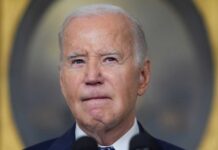
In a shocking and unanimous decision, the Supreme Court upheld the Food Drug Administration’s (FDA) authority to ban flavored e-cigarettes, dealing a blow to vaping companies and personal freedom.
The ruling sides with the FDA rejected Triton Distribution’s application to sell flavored e-juices, overturning a previous federal appeals court decision that questioned the agency’s rationale.
Justice Samuel Alito, writing for the court, claimed the FDA did not act “arbitrarily or capriciously” when changing its requirements for product approval, essentially giving the federal agency a blank check to restrict consumer choices.
The FDA has already rejected over 26 million flavored e-cigarette applications, with only 34 products receiving authorization, showcasing the agency’s aggressive stance against the vaping industry.
While anti-tobacco activists are celebrating the Supreme Court’s ruling, it ignores the rights of adult consumers who use these products as alternatives to traditional cigarettes.
Vape manufacturers have consistently argued that flavored products serve as safer alternatives for smokers trying to quit – a point largely dismissed by the FDA and now the high court.
The case has now been sent back to a lower court for further review. Still, the Supreme Court’s endorsement of the FDA’s regulatory approach signals difficult times ahead for the vaping industry and consumer choice.
The agency claims its decisions are based on protecting youth, noting that over 1.6 million children use e-cigarettes, with nearly 90% preferring flavored brands.
Justice Sonia Sotomayor emphasized during the proceedings that manufacturers need to provide “rigorous scientific evidence” proving their products’ benefits outweigh potential risks to youth.
This standard creates an almost impossible barrier for companies seeking approval, effectively allowing the government to pick winners and losers in the marketplace.
Even more concerning are the administrative changes happening within the FDA itself. Brian King, the agency’s top tobacco regulator, was recently removed from his position amid workforce cuts and policy shifts.
Although vape manufacturers can technically reapply for FDA approval with new evidence, the Supreme Court’s ruling has established a precedent that heavily favors government restriction over individual liberty and consumer choice.
The FDA’s decision to uphold the ban indicates a commitment to tough regulation, even amidst administrative shifts and workforce changes.
Many conservatives agree that this move protects American families by prioritizing health over industry interests, directly opposing woke agendas promoting youth endangerment.
Prioritizing children’s health while maintaining freedom of choice remains essential. This action reinforces a stance against growing youth nicotine addiction.
Ultimately, the FDA’s future measures will demonstrate whether it will stand firm on its commitments or succumb to industry pressures.



















